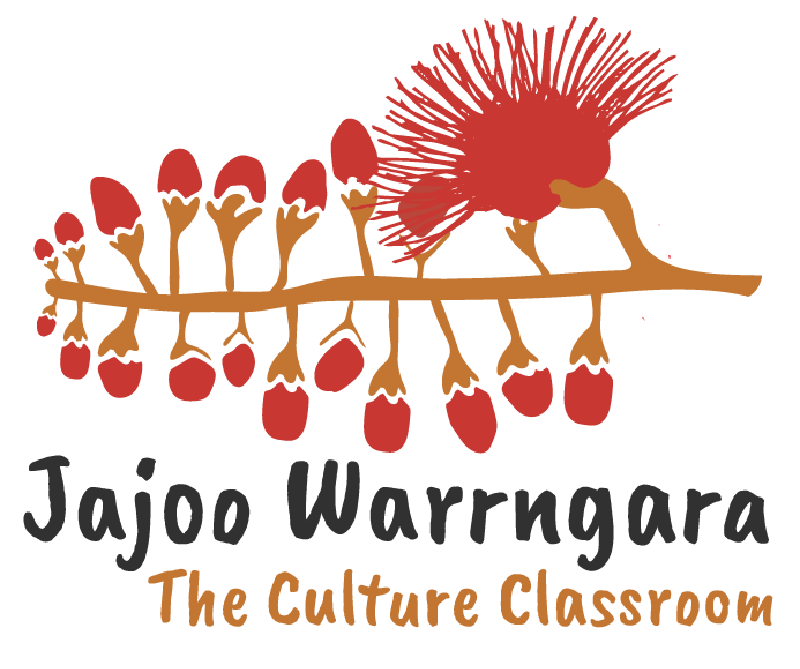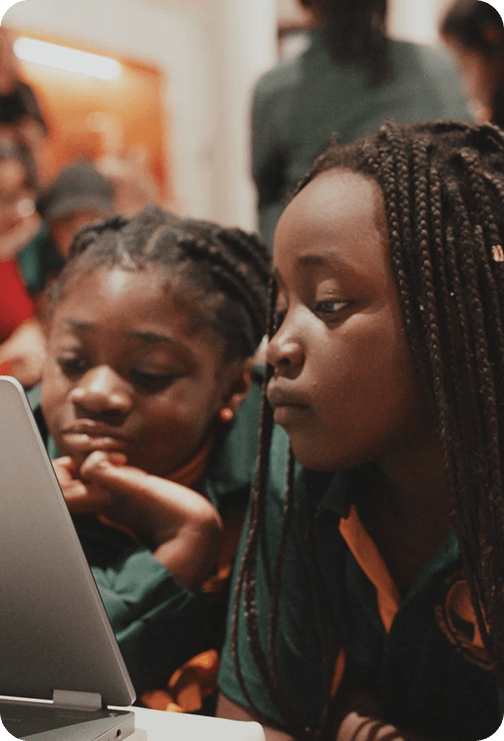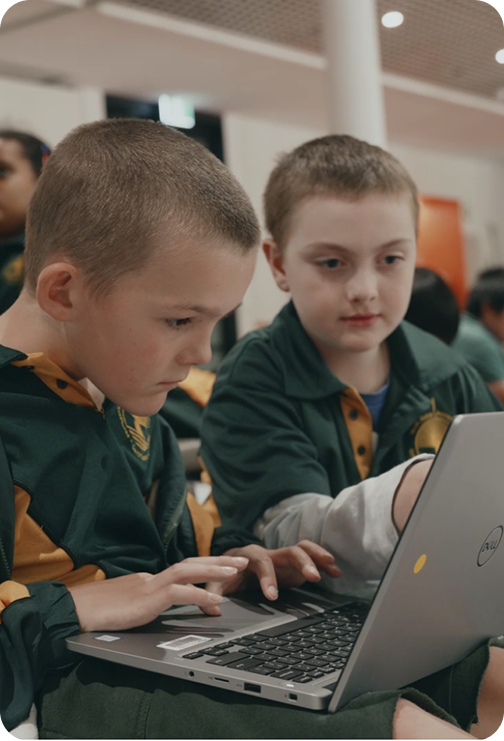About Jajoo Warrngara
Jajoo Warrngara was created by the not-for-profit organisation SharingStories Foundation. We work with Aboriginal and Torres Strait Islander communities to protect, maintain and grow language, stories and cultural heritage through digital technologies and vibrant artistic art forms for the education of all children today and future generations tomorrow.
There are many ways you can support SharingStories' work with communities, including Direct and Regular Giving.
Gifts to support the work of SharingStories Foundation make our programs possible. We encourage schools to build and maintain communications and input from local communities.
Education
All the lessons and units of work on Jajoo Warrngara align to V9 of the Australian Curriculum. They have been written to support the inclusion of the Cross Curriculum Priority - Aboriginal and Torres Strait Islander Histories and Cultures through content that fits naturally within learning areas.
The Cross-Curriculum Priority Aboriginal and Torres Strait Islander Histories and Cultures is an integral and mandated component of the Australian Curriculum. Jajoo Warrngara provides educators the opportunity to embed this important cross-curriculum priority in a meaningful and authentic way.
The Cross-Curriculum Priority Aboriginal and Torres Strait Islander Histories and Cultures adds depth and richness to all student learning. It allows schools and students to deepen their understanding of First Nations peoples and allows First Nations students to see their identities reflected in a Western educational setting. Through the provision of community-led educational resources and Classroom Teaching Protocols, Jajoo Warrngara helps to cultivate learning environments that value and respond to the diversity of First Nations cultures, histories, and languages. Our resources are developed to create culturally safe spaces for both students and educators.
Jajoo Warrngara Educational Resources have been designed to support educators’ professional growth by aligning to the Professional Standards for Teachers. They have been developed to improve knowledge of content and teaching strategies, as well as develop understanding and respect for First Nations histories, cultures, and languages.
Engaging First Nations peoples in education allows schools to shape and create inclusive, effective learning solutions that meet the needs of students and communities.
Embedding First Nations perspectives in your school creates opportunities to challenge the Western dominant viewpoints of First Nations peoples, often influenced by media representations of negative stereotypes and racism.
Uncle Ernie Grant is an Elder of the Jirrbal tribe from the Tully area in Far North Queensland. His Holistic Framework is an approach to learning, promoting cross-cultural understanding, and adding value to learning for all students.The Framework supports a holistic approach to viewing the world through Land, Language and Culture, demonstrating how these connect to Relationships, Place and Time.
Perspectives are ways of seeing the world. They affect the way we interact with the environment and the perceptions we have about ourselves, our culture and the way we see others.
Although many books and education materials will provide an ‘Indigenous perspective’, these generalisations are often misleading, and don't provide authentic place-based learning opportunities that reflect the diversity of First Nations peoples and knowledges. All Jajoo Warrngara: The Culture Classroom resources are developed on Country with Traditional Custodians who have shared their cultural knowledges, languages and stories. Classroom Teaching Protocols are developed and approved in conversation with the Traditional Custodians who share their cultural knowledges to support the cultural safety of both student and educator.
Schools should develop guides with agreed pay scales to cover payments to First Nations community members who offer, or are requested to engage in school cultural activities. These might include:a Welcome to Country, guest speaker programs, artist in residence and general curriculum engagement activities.
A strong school/community partnership is one where both are working towards an authentic goal that will impact the school setting for the long term. These partnerships are central to embedding localised First Nations perspectives, and understanding the needs and aspirations of the community for their students.
Cultural safety is about creating an environment that is safe for First Nations people. It is important that First Nations cultures are valued in schools and that the potential for unconscious bias, racism, and discrimination is addressed, so First Nations students see themselves and their cultures reflected positively in the school setting.
Yes, all the lessons developed by Jajoo Warrngara: The Culture Classroom provide ways of working with your local Traditional Custodians or Elders to localise learning. You can also register your interest for Jajoo Warrngara: The Culture Classroom Professional Development Building Community Partnerships here https://jajoowarrngara.org/professionaldevelopment/building-community-partnerships
Lessons can be located by clicking on the 'Lessons' tab in the menu bar. You can filter your search by subject and/or year level, or simply use the search bar. All results can be accessed through the map, which directs you to the communities who have shared the knowledge, or through the tiles below the map which take you directly to the unit.
The Lessons page includes a place-based experience that connects you to Country and community. Use the map to navigate to each community and view their units.
Each of the educational resources are presented as units containing lessons. These units include:Overview, Acknowledgement, Essential Questions, Description of Community, and Links to Resources, including films, multi-touch books, Discovery Maps, Classroom Teaching Protocols, and any printable teacher resources required for that unit.
Click on the Media tab in the menu bar to explore all community media. The Media page includes a place-based experience that connects you to Country and community. Use the map to navigate to each community and view their media.
You can filter your search by subject and year level to find relevant media.You can also filter your search by different types of media: Discovery Maps, Multi-touch Books and films.
Discovery Maps are interactive maps for students to connect to Country and culture as they explore different key learning areas and concepts of various communities.
Multi-touch Books deliver knowledge and stories in an exciting format. You will experience a Welcome to Country, then meet the storyteller and community through interviews and photographs. You can learn cultural stories, delivered in bilingual audio and text, and interact with artwork, animations, soundscapes, and maps filled with drone footage and video.
Once you have selected a piece of media, you can see which lessons are associated below the media play window.
Classroom Teaching Protocols are delivered by First Nations Custodians and will support teacher confidence in sharing cultural content. They have been developed to support professional growth, cultural understanding/safety and confidence when embedding Aboriginal and Torres Strait Islander Histories and Cultures as part of the Australian Curriculum. The cultural information in these documents has been shared directly by the Custodians and Community Members who have shared their cultural knowledge.
Custodians determine what, how and where outcomes are shared in the public domain, and all Traditional Custodians retain copyright and Indigenous Cultural Intellectual Property in their work.
Subscriptions
We except Visa, Mastercard or Paypal.
You can cancel anytime. Just log in to your account, navigate to the Subscription section, and click the cancel button.
To add new users simply login to your account and upgrade your subscription. Please note that an additional fee may apply if you are exceeding the number of users as part of your original subscription fee.
You may buy more than one lesson but if you are going to be a frequent user, it may be a better financial option to pay for an upgrade and access the entire Jajoo Warrngara site.
Your subscription membership will last for 12 months from the date of payment. Your membership will renew annually and continue as long as you choose to remain a member.
You can upgrade at any time. Simply login to your account and upgrade your subscription and pay the upgrade fee.
No. You cannot share resources with your team if they are not part of your original subscription. Please remember that all the cultural content on Jajoo Warrngara has been generously shared by Senior Custodians and the communities who hold this cultural knowledge for future generations.
This ensures that Jajoo Warrngara are offering educators authentic community approved resources. To supplement membership fees and make Jajoo Warrngara available to all schools, we work in partnership with funders, sponsors and donors. All subscriptions profits will be paid directly back to community orgnanisations to allow for continued cultural continuity. When you share the resources outside your subscription you are denying Senior Custodians and communities payment for knowledge that is their cultural intellectual property.
Technical Support
Have you forgotten your password? Click forgot password and a link will be sent to your nominated email address for a reset password. Still can't login? Contact us at info@sharingstoriesfoundation.org
All Jajoo Warrngara multi-touch books and Discovery Maps are free to use. You will need to create an account to access the teacher resources.
Contact us at info@sharingstoriesfoundation.org to log a technical issue.
All material on Jajoo Warrngara aligns with the Australian Curriculum, across all Key Learning Areas and Cross Curriculum Priorites, with a strong focus on embedding Aboriginal and Torres Strait Islander Histories and Cultures in authentic and meaningful ways. We have included Classroom Teaching Protocols to support curriculum delivery. These have been developed in collaboration with each community to ensure the cultural safey of both educators and students.





